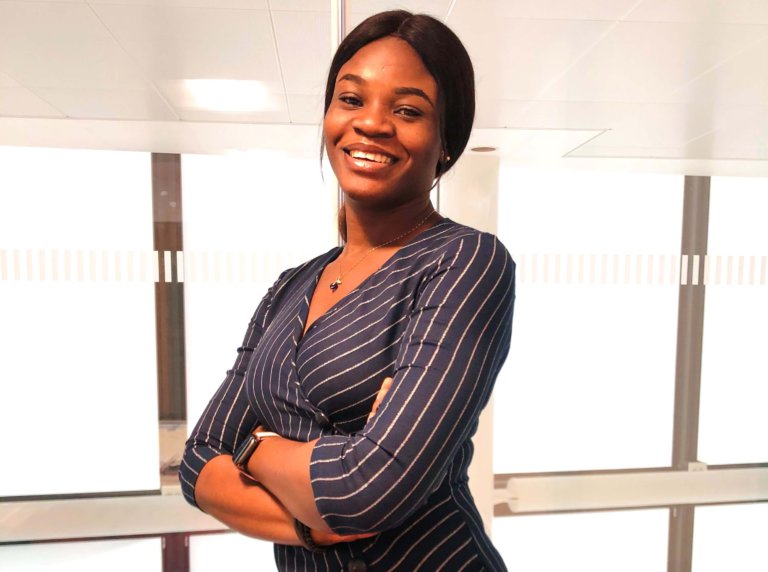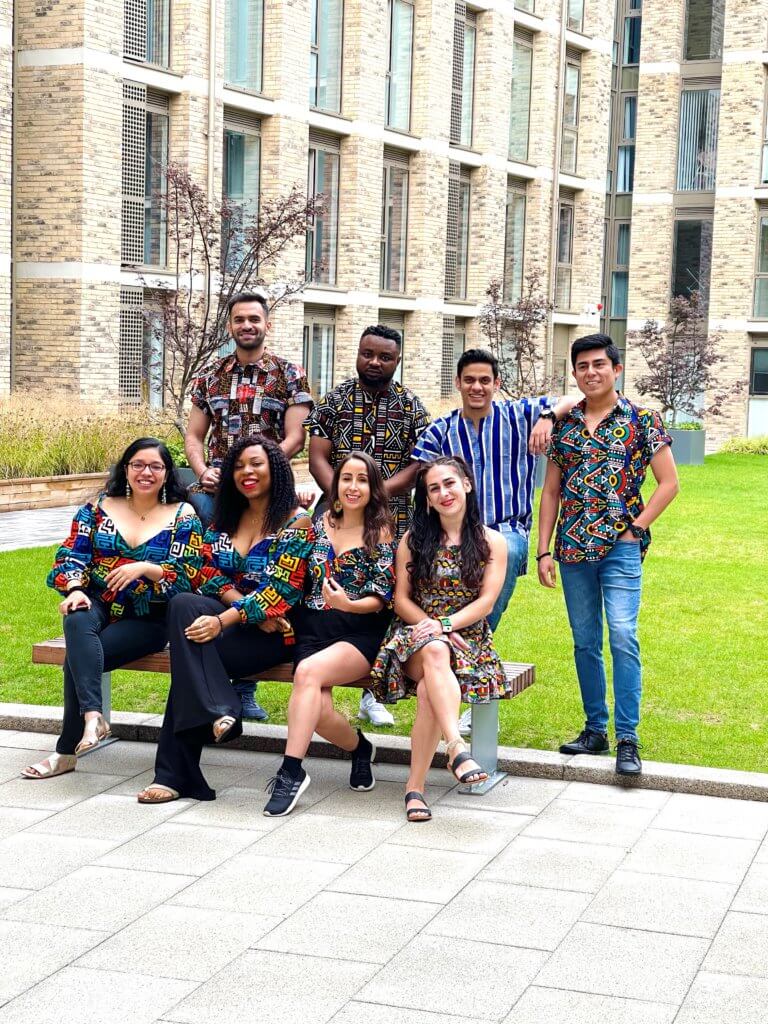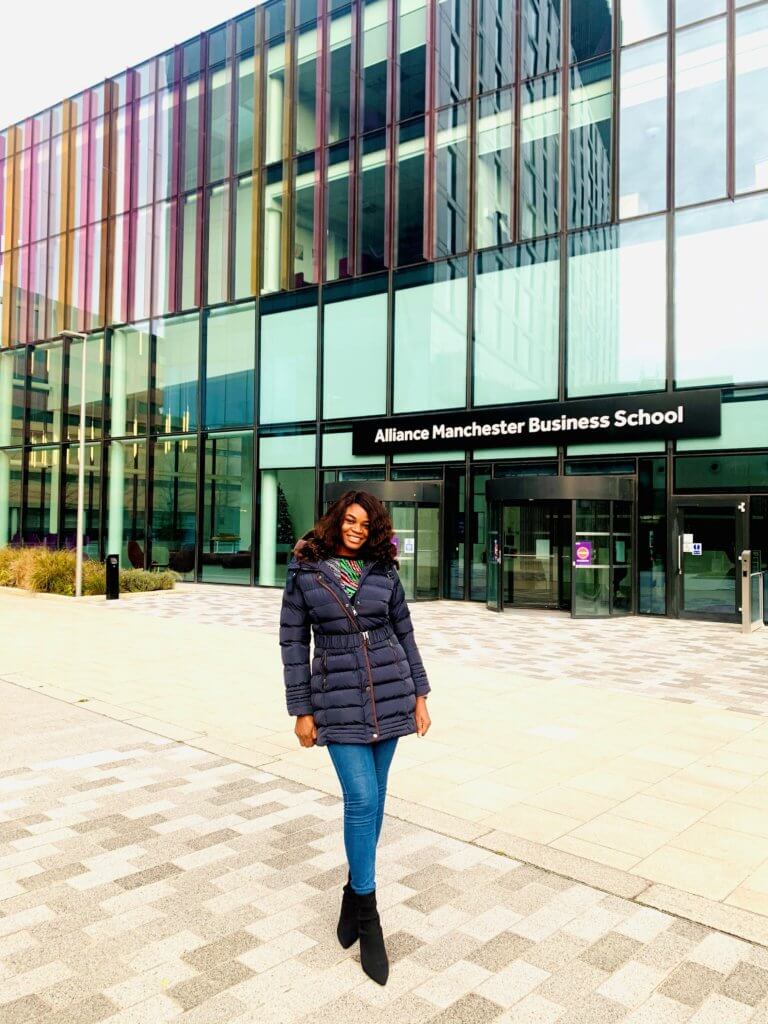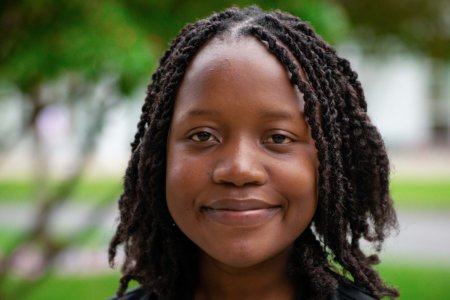
When Nigerian Oluwafikayomi Agbola sought a UK city to pursue her MBA degree, she chose one that brims with character: Manchester. Known to be one of the best student cities in the UK, the birthplace of the Industrial Revolution and the home of several musical genres, this is a city that she knew will never be short of events and inspiration for her.
As for her business school, she wanted one grounded in the real world. “The major push to Alliance Manchester Business School for me was the practicality of the programme,” Agbola explains. “The MBA degree programme has three live consultancy projects: not-for-profit, commercial business and international business.”

Agbola believes studying economics means there would be no limit to where she could work. Source: Oluwafikayomi Agbola
Below we talk to this Nigerian student about how she applied for her programme and all the useful advice she has for international students who want to study in the UK:
What sparked your interest in economics?
Honestly, I was great at elementary economics in secondary school and I also like numbers too. So, I just thought, “why not economics?”
Because economics influences everything, I believed studying it would mean there would be no limit to where I could work. The impact of strategic thinking could be amazing on businesses and even the government.
Also, economics was one of the most difficult courses to gain admission into at the University of Ibadan so I wanted to prove a point as well. To whom? I’m not too sure.
Tell us more about your career trajectory in finance.
Interestingly, I’ve never worked in a core finance role. I became a chartered accountant right after my undergraduate programme.
I’m more interested in consulting and business. My last role before my MBA degree was at a Ghanaian company as an associate strategy consultant.
I also worked as an account manager at a bank for two years. These experiences have shaped me and helped my interest in tactical planning for business growth.
I’m also proudly a fashion entrepreneur with Bittany as a side-hobby. I even managed a fashion house at one point which was an amazing experience.
View this post on Instagram
What made you choose to pursue your MBA degree at Alliance Manchester Business School?
My decision to pursue a masters was unwavering. After working for over five years, it felt like the right time to get one.
However, I needed a degree that would expose me to the nitty-gritty of business as I will someday become an international business owner. So, why not an MBA degree?
The major push to Alliance for me was the practicality of the programme. The MBA degree programme has three live consultancy projects: not-for-profit, commercial business and international business.
I read up on them and loved that they are not mere simulations of business cases. Rather, the chance to get to work with real-life clients with real-world business issues. It’s a great hands-on challenge.
Personally, I was leaning towards a highly-ranked international institution over choosing a destination like Manchester or the UK. Then, I read more about the city because I only knew that it was the home for football.

Agbola decided to pursue a master’s degree after working for five years. Source: Oluwafikayomi Agbola
From my research, I discovered that Manchester is thriving as a leading European business destination and the most successful city in the UK after London to attract Foreign Direct Investment (FDI). Then I fell in love with the fashion revolution and the city’s roots as the centre of the cotton industry in the UK — it felt like a perfect match for me.
Walk us through the application process for your MBA degree.
Check the eligibility criteria on the website and then submit your application form. After, you have to submit your essay, CV, academic and professional qualification documents and relevant test scores.
Your references will be contacted by the school so make sure you key in the correct information. Next, is the video assessment because without this your application won’t be assessed.
The video assessment has four questions that are designed to be answered without real-time preparation. They test your sense of personality, potential and communication skills.
In particular, they also want to know your ability to think on your feet and communicate in a concise manner. This will take about half an hour to complete and if successful, you’ll be invited for a personal interview.
At Alliance, it’s not just about having the most experience or the best test results, you need to project your educational and career achievements, and leadership and entrepreneurship qualities. All of these are looked at holistically.
I remember being worried about funding because there wasn’t a separate process for scholarship applications. My application was however considered for the Forte Foundation Scholarship and it was sent alongside my admission. This whole application process took me about two months.
What if you studied this at a local institution in Nigeria? Do you think it would have made a difference?
Yes, it would have. I wouldn’t have gotten this much international exposure and work experience and I love that it’s outside of my comfort zone. My experience is helping me discover more interesting facts and strengths that I possess.
What’s a class that’s stood out for you so far?
Many classes had at least one interesting or peculiar event but my Strategy and Competition class have been consistently interesting. The teacher is so practical, energetic and engaging.
The topics and case studies were also super insightful. They made us read the cases before class so we have an understanding and an input.

Agbola’s goal was to bridge her project management knowledge gap. Source: Oluwafikayomi Agbola
What about teachers? How have they supported you thus far?
Because of COVID-19, I had half of my classes online so it was difficult to connect with the lecturers since we are over 100 students. However, the lecturers had online office hours where you could discuss things with them one-on-one. Once our classes were back on campus, they would always be there to support us as well which is helpful.
Are there any practical learning elements in your programme that you get to apply to your life now?
The “Manchester Method” is well-known for practicality which is learning by doing. I got to work in teams along with a charity organisation and a commercial business. Soon, I’ll commence the international business project which is the capstone.
We act as consultants for these real-life companies and practice the theories and processes we were taught in the classes. The first two consultancy projects were challenging and I’m sure I won’t be any different.
However, we’re always very well prepared and well-equipped to deliver the best as expected.
What are your academic goals at Alliance? What skills have you gained thus far?
My goal was to bridge my project management knowledge gap. Thus, being able to take leadership roles in my consultancy projects during the MBA degree programme is fulfilling. I have gained many skills that I believe have made me a well-rounded and better strategic problem-solver and decision-maker.
What advice would you give international students who want to pursue a degree in the UK?
Do your research well and network with people who are already studying in the UK. I never thought I’d say this but before my MBA degree, I thought networking was overrated — it’s absolutely not.
There are groups on Facebook you can join based on your interests as it’s always a good idea to have made some connections and friends before you arrive. Ultimately, after you find the most suitable course or institution, you should plan your funding and research scholarship options.
You should also plan for your student visa and health insurance. This, along with preparing for British weather (with warm clothing and rain boots!). Another thing you should have sorted is your student accommodation and your bank account.
When you arrive, you’ll need to figure out public transport because cabs are not budget-friendly. A good idea is to research how many hours you’re allowed to work part-time and full-time so you can take advantage of this to build your international work experience.
Lastly, have fun and explore the UK! You didn’t leave your country to become a couch potato!
What about tips to budget as a student abroad?
Before moving abroad, plan your finances properly. First, it would be helpful to use Excel or something similar to record your income or savings and expected expenditure (including total school fees and living expenses).
Be sure to plan for contingencies and always have some pocket change. Although most schools allow instalment payments, it’s better to plan for the total amount so you don’t have to think about it later.
It’s also better to consider funding from family and friends (as soft loans) before turning to the uni’s recommended institutions which should be used as a last resort. The majority of MBA students get to intern during the summer and the income from that will come in handy.
When you eventually move to the UK, you should have a monthly budget based on your savings or expected income. There are a lot of student discounts available as well so make sure to stay alert and informed.
It also helps to network with older students as they have great tips on how to find affordable apartments.










